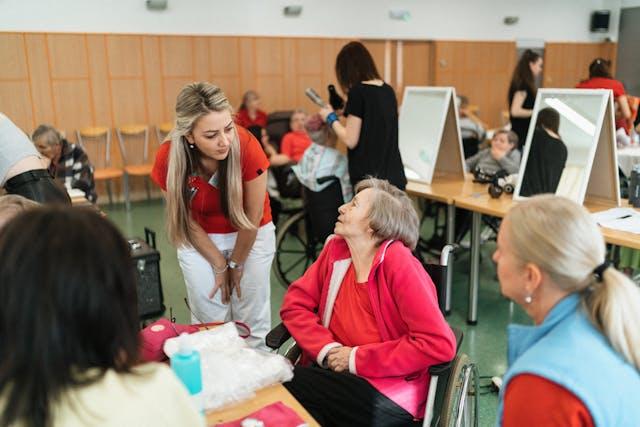Creating a Retirement Bucket List: Adventures to Embark on in Your Golden Years

Do you have a retirement bucket list? Do you know what that even is?
The origins of the phrase are often attributed to screenwriter Justin Zackham, while writing “The Bucket List” script, from a 2007 movie starring Jack Nicholson and Morgan Freeman as two terminally ill friends who hit the road with a list of things they wanted to do before they “kicked the bucket.” However, it appears the phrase predated that script, as evidenced by Google Ngram results.
Whatever the phrase’s etymology, the practice of creating a retirement bucket list can turn a so-so life into a vivid and exciting one. Planning and enjoying memorable, pleasurable and soul-stirring experiences helps manage stress and keeps you active and healthy during retirement. It’s also a great way to explore the world in more depth, challenge yourself in creative and constructive ways, and even learn a little more about yourself and your place on the planet.
The Significance of a Retirement Bucket List
Retirement is the perfect life stage to explore your bucket list and start marking those items as “done.” Unless you’re independently wealthy and don’t need to work, there’s no better time to pursue those life dreams and longings. Now is when you have the time, the funds, and (we hope) the good health and energy to pursue your interests.
What’s more, checking items off that retirement bucket list helps create a fulfilling retirement and a rich, engaging life for yourself. That, in turn, helps you maintain great mental and emotional health. Pursuing the experiences on your retirement bucket list even helps you maintain great physical health as well.
That might seem counterintuitive. After all, isn’t this the time for rest? Aren’t we supposed to slow down as we age? Actually, studies show that retirees who begin to pursue those bucket list items and stay active from the very beginning of their retirement enjoy a lower risk of mortality than inactive seniors. And a 2016 Merrill Lynch study (PDF) discovered that seniors are getting the message; 88% of them who participated in that study said they view retirement not as a winding down but a brand new start.
Bucket List Retirement Ideas
Have a little fun daydreaming in a wide-open, no-holds-barred, blue-sky spirit. What would you do if nothing stood in your way? Consider the following retirement bucket list ideas.
Travel Adventures
You can have a great time exploring different travel destinations, both near and far. Think of all the places you love, and all the places you’d love to see at least once. Experiencing different cultures, cuisines, and traditions in a more immersive way can shift your own perspectives, make you more empathetic, and give you a fuller understanding of the world around us.
Perhaps you’d like to make it a challenge based on your passions, such as visiting each of the 63 designated National Parks or catch a game at each of the 30 MLB stadiums in the U.S. Or perhaps you visited another country in your youth and you’d like to recreate that trip to see how things have changed over the years.
Learning Opportunities
Retirement is the perfect time to pursue new hobbies, take classes in new subjects, or even learn a new language. You might want to combine a language class with a travel goal to enrich your trip to another country.
One great resource for retirees with learning-related items on their bucket lists is the local community college. Many of these institutions offer low-stress classes to area seniors at reduced cost, and some will even let seniors audit regular classes at no cost. These classes can cover a wide variety of subjects, from automotive repair to zoology.
And if you don’t see a class that interests you, why not contact the college’s administration and offer to teach a workshop yourself? Retirees have a wealth of experience and knowledge that make them valuable teachers and guides for others.
Volunteer Work
Charitable activities and volunteering are wonderful activities for seniors. One study showed that Americans aged 60 and up who volunteered their time and energy in retirement experienced lower rates of disability and even increased their levels of well-being compared to other seniors who didn’t engage in charitable work. Volunteer work also improves your mental health by keeping you socially engaged.
Make a list of those causes that really speak to your soul and align with your beliefs and values. Working at a charity’s retail shop, training as a crisis counselor to work with victims of crime and intimate partner violence, or helping your church with its annual rummage sale can all be wonderful experiences that give you a sense of fulfillment while also ticking off a bucket list item.
Physical Fitness
Too many seniors misunderstand retirement as the age when fitness and physical activity slow down or cease altogether. However, retirees who stay active enjoy healthier lives and help keep some pretty scary diseases at bay. For seniors, setting fitness goals is a great way to enjoy those years to their fullest. Thrilling activities like skydiving, scuba diving, or hot air ballooning may also beckon and spark your interest.
Start by getting a full physical and running your plans by your medical care provider to ensure you’re healthy enough to pursue your physical fitness goals. Then consider just what seniors like you are capable of, such as:
- Cherie Gruenfeld, the 78-year-old woman who became the oldest woman to finish the Ironman World Championship;
- Tao Porchon-Lynch, the world’s oldest yoga teacher (according to Guinness World Records) who was still leading class and recording instruction videos at 96 and beyond;
- Edith Wilma Connor, who took up fitness in her late sixties and won her first bodybuilding competition when she was 65;
- R. Laurence Macon, who set a record by running 113 races in 2011 at the age of 63; and
- Margaret Mackenzie McAlpine, who became the Oldest Female to Paraglide Tandem at the age of 104.
As the examples of these inspiring people shows us, age doesn’t have to stop you or even slow you down all that much. Maybe we really are just as old as we feel…?
Creative Pursuits
Now that you don’t have to worry about “something to fall back on,” it’s the perfect time to pursue your artistic interests and creativity. You might also choose to take classes in some artistic endeavor you’ve always wanted to try or get back to, such as improv or sketch comedy, sculpture, ceramics, life drawing, or a musical instrument.
Alternatively, maybe you want to be the teacher and share the expertise in a visual or performing art form that you’ve practiced for years. Share that wisdom and expertise with the next generation of artists for a truly inspiring legacy.
How to Start Building Your Retirement Bucket List
Before you begin to craft your personal retirement bucket list, remember what the point of all this really is. It’s about creating more joy, fun, excitement, and meaning in your life. In that sense, the specifics aren’t as important as the way they make you feel. As you consider new list items, pay attention to your body and emotions. Look for things that trigger an “oh, that sounds like fun” response or even evoke a little tickle in the tummy.
What you ultimately decide to include on your retirement bucket list depends on a lot of factors that can vary widely from person to person. Take into consideration your overall health, available funds, past goals and dreams that you never quite got around to, and your partner and family’s needs.
It’s important to tailor your list to your goals, interests, and aspirations. It’s also crucial to be realistic in finalizing that list. What you want to do and what you can afford to do might not mesh. If that’s the case, explore smaller versions of your dream bucket list item. Instead of spending a year in Paris learning how to paint, maybe you can take a two-week art tour. If you want to walk the full length of the Appalachian Trail but aren’t physically capable of that kind of prolonged outdoor adventure, why not join a group for a two-day hiking and camping adventure?
Sharing Your Retirement Bucket List
Now that you have your list in hand, consider whether or not to share it with friends and loved ones. Sharing your retirement bucket list might upset some folks, especially if they’re particularly sensitive to words that might provoke a fear of injury or death. On the other hand, sharing with kindred spirits can lead to shared experiences and bonding.
You can even involve your family and friends in pursuing your bucket list items. A shared experience creates wonderful memories for all. Taking a class with a peer who’s also interested in the subject gives you a study buddy and might help you both get even more out of the learning experience. Bring your kids and grandkids with you on a trip for a richer and more meaningful experience.
Overcoming Obstacles and Fears
If creating your list produces unanticipated feelings of anxiety or fear, rest assured this is perfectly normal. Anytime we challenge ourselves to move outside our comfort zone, we might find ourselves resisting that activity or event.
Sometimes fear is a friend. It can help us identify risks in advance and find ways around or through them. It helps keep us safe. And if there is no way to comfortably and efficiently mitigate those risks, maybe that’s not a great item for your retirement bucket list. If that’s the case, consider other experiences, or look for ways to take a smaller bite out of that desire.
However, don’t count yourself out just yet. Consider the experience of Estelle Getty. The famous Sophia of “The Golden GIrls” only achieved her acting goals at the age of 63. At 80, Yuichiro Miura decided to attempt something that would strike fear into the hearts of people a third of his age, but he overcame those fears and became the oldest person to reach the top of Mount Everest. And Smoky Dawson wrote, recorded, and released an entire album of Western music at 92.
Conclusion
Creating a retirement bucket list helps you commit to new experiences. Pursuing those experiences helps you stay physically fit, mentally healthy, and socially engaged. It can even change your life in glorious ways.
Retirement doesn’t have to be the end, or a winding down of your life. In fact, as the late Maya Angelou said, “Mostly, what I have learned so far about aging, despite the creakiness of one’s bones and cragginess of one’s once-silken skin, is this: Do it. By all means, do it.” Getting out into the world and pursuing your passions is a great way to stay young at heart forever.



